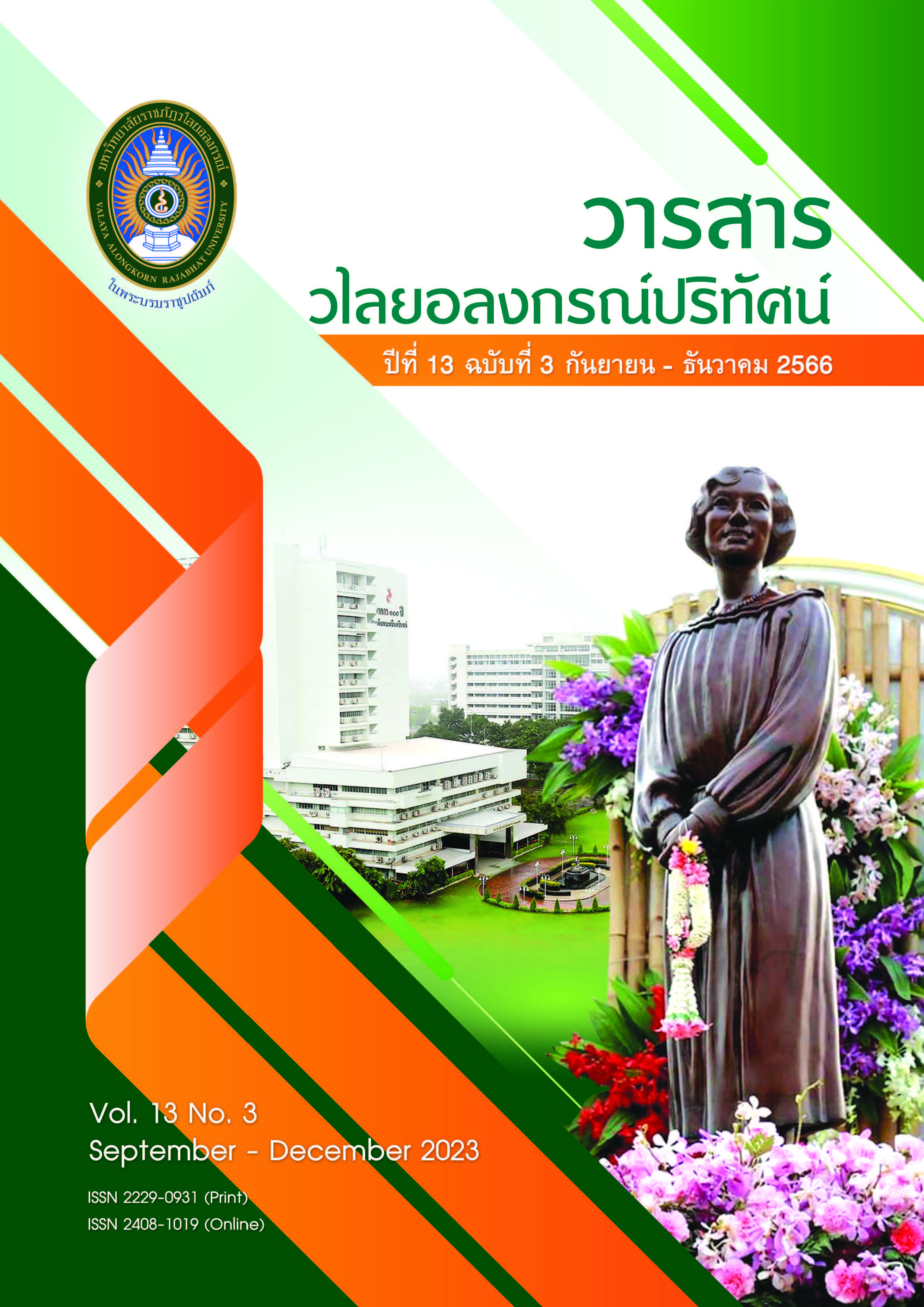การศึกษากรอบความคิดแบบเติบโตของนักศึกษาครูมหาวิทยาลัยราชภัฏวไลยอลงกรณ์ ในพระบรมราชูปถัมภ์
คำสำคัญ:
กรอบความคิดแบบเติบโต, นักศึกษาครูบทคัดย่อ
งานวิจัยนี้มีวัตถุประสงค์เพื่อ (1) ศึกษากรอบความคิดแบบเติบโตของนักศึกษาครู มหาวิทยาลัยราชภัฏวไลยอลงกรณ์ ในพระบรมราชูปถัมภ์ และ (2) เปรียบเทียบกรอบความคิด แบบเติบโตของนักศึกษาครูมหาวิทยาลัยราชภัฏวไลยอลงกรณ์ ในพระบรมราชูปถัมภ์ จำแนกตามเพศ กลุ่มสาขาวิชา และผลการเรียนเฉลี่ยสะสม กลุ่มตัวอย่างในการวิจัย คือ นักศึกษาครูมหาวิทยาลัย ราชภัฏวไลยอลงกรณ์ ในพระบรมราชูปถัมภ์ จำนวน 186 คน โดยใช้วิธีการสุ่มตัวอย่างแบบแบ่งชั้น เครื่องมือวิจัยเป็นแบบสอบถามชนิดมาตรประมาณค่า 5 ระดับ มีค่าความเที่ยงทั้งฉบับเท่ากับ 0.98 วิเคราะห์ข้อมูลโดยใช้สถิติเชิงบรรยาย ได้แก่ ค่าความถี่ ร้อยละ ค่าเฉลี่ย และส่วนเบี่ยงเบนมาตรฐาน ใช้สถิติเชิงสรุปอ้างอิง ได้แก่ t-test สำหรับสองกลุ่มตัวอย่างที่เป็นอิสระจากกัน และ F-test ด้วย การวิเคราะห์ความแปรปรวนทางเดียว
ผลการวิจัย พบว่า (1) นักศึกษาครูมีกรอบความคิดแบบเติบโต โดยภาพรวมอยู่ในระดับมาก (M = 3.92, S.D. = 0.52) และเมื่อพิจารณาเป็นรายด้านพบว่า ทุกด้านอยู่ในระดับมากเช่นกัน โดยด้านความสามารถในการพัฒนาศักยภาพทางปัญญา มีค่าเฉลี่ยสูงสุด (M = 3.98, S.D. = 0.56) รองลงมา ได้แก่ ด้านความเพียรพยายามในการเรียนรู้ (M = 3.95, S.D. = 0.54) และด้านแรงบันดาลใจและรับผิดชอบในการเรียนรู้ของตนเอง (M = 3.94, S.D. = 0.53) ตามลำดับ ส่วนด้านที่มีค่าเฉลี่ยต่ำสุด ได้แก่ ด้านการรับมือกับความท้าทาย (M = 3.85, S.D. = 0.50) (2) กรอบความคิดแบบเติบโตของนักศึกษาครู จำแนกตาม เพศ กลุ่มสาขาวิชาที่เรียน และระดับผลการเรียนเฉลี่ยสะสม พบว่า ไม่แตกต่างกัน
เอกสารอ้างอิง
ชนมน สุขวงศ์. (2566). Growth mindset : กรอบความคิดเติบโตหัวใจสำคัญสำหรับนักศึกษาครูยุคใหม่. วารสารมหาวิทยาลัยมหามกุฏราชวิทยาลัย วิทยาเขตร้อยเอ็ด. 12(1): 571 - 583.
ชนิตา รุ่งเรือง และเสรี ชัดแช้ม. (2559). กรอบความคิดเติบโต: แนวทางใหม่แห่งการพัฒนาศักยภาพมนุษย์. วิทยาการวิจัยและวิทยาการปัญญา. 14(1): 1-13.
เนตรนิยมาศ วรรณพยันต์. (2560). วิถีครูกับการพัฒนากรอบความคิดศิษย์. วารสารหาดใหญ่วิชาการ. 15(2): 158-195.
บุญชม ศรีสะอาด. (2560). การวิจัยเบื้องต้น. กรุงเทพฯ: สุวีริยาสาส์น.
ปัทมาภรณ์ ศรีราษฎร์. (2561). แนวทางการพัฒนากรอบความคิดแบบเติบโตของครู. วารสารอิเล็กทรอนิกส์ทางการศึกษา. 13(1): 389-399.
ปิยวรรณ วิเศษสุวรรณภูมิ และพิทชยา ตั้งพรไพบูลย์. (2566). กรอบความคิดแบบแบบเติบโต: ทักษะที่จําเป็นแห่งโลกยุคพลิกผัน. วารสารครุศาสตร์. 50(1): 1-12.
มหาวิทยาลัยราชภัฏวไลยอลงกรณ์ ในพระบรมราชูปถัมภ์. (2566). สถิติข้อมูลนักศึกษา. (ออนไลน์), เข้าถึงได้จาก: http://acad.vru.ac.th/about_acad/ac_StudentActive.php. (2566, 10 มิถุนายน)
ศิริชัย กาญจนวาสี. (2556). ทฤษฎีการทดสอบแบบดั้งเดิม. (พิมพ์ครั้งที่ 7). กรุงเทพฯ: โรงพิมพ์แห่งจุฬาลงกรณ์มหาวิทยาลัย.
ศูนย์จิตวิทยาการศึกษา มูลนิธิยุวสถิรคุณ. (2562). การพัฒนากรอบแนวคิด. (ออนไลน์), เข้าถึงได้จาก: http://www.cepthailand.org. (2566, 18 สิงหาคม).
อัษฎา พลอยโสภณ. (2564). นักศึกษาครูกับการพัฒนากรอบแนวคิดแบบเติบโต. วารสารมนุษยศาสตร์และสังคมศาสตร์ มหาวิทยาลัยราชภัฏสงขลา. 3(2): 115 - 130.
Burgoyne, A. P., Hambrick, D. Z., & Macnamara, B. N. (2020). How firm are the foundations of mind-set theory? the claims appear stronger than the evidence. Psychological science. 31(3): 258 - 267.
Cristobal, E., Flavián, C., & Guinaliu, M. (2007). Perceived e-service quality (PeSQ) Measurement validation and effects on consumer satisfaction and web site loyalty. Managing service quality: An international journal. 17(3): 317-340.
Dweck, C. (2006). Mindset: The new psychology of success. Random House.
Hochanadel, A. & Finamore, D. (2015). Fixed and growth mindset in education and how grit helps students persist in the face of adversity. Journal of international education research first quarter. 11(1): 47-50.
Johansen, B., & Euchner, J. (2013). Navigating the VUCA world. Research-Technology Management. 56(1): 10-15.
Nunnally, J. C. (1967). Psychometric theory. New York: McGraw-Hill.
Nunnally, J. C. & Bernstein, I. H. (1994). Psychometric theory. (3rd ed.). New York: McGraw Hill.
Sisk, V. F., Burgoyne, A. P., Sun, J., Butler, J. L., & Macnamara, B. N. (2018). To what extent and under which circumstances are growth mind-sets important to academic achievement? Two meta-analyses. Psychological science. 29(4): 549–571.
ดาวน์โหลด
เผยแพร่แล้ว
รูปแบบการอ้างอิง
ฉบับ
ประเภทบทความ
สัญญาอนุญาต
ลิขสิทธิ์ (c) 2023 เมษา นวลศรี, กุลชาติ พันธุวรกุล

อนุญาตภายใต้เงื่อนไข Creative Commons Attribution-NonCommercial-NoDerivatives 4.0 International License.
ข้อความที่ปรากฏในบทความแต่ละเรื่องในวารสารวไลยอลงกรณ์ปริทัศน์ เป็นความคิดเห็นของผู้นิพนธ์แต่ละท่าน มิใช่เป็นทัศนะและมิใช่ความรับผิดชอบของกองบรรณาธิการจัดทำวารสาร และ
มหาวิทยาลัยราชภัฏวไลยอลงกรณ์ ในพระบรมราชูปถัมภ์


